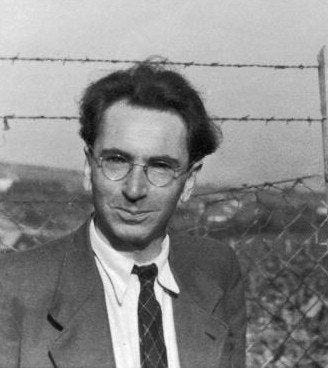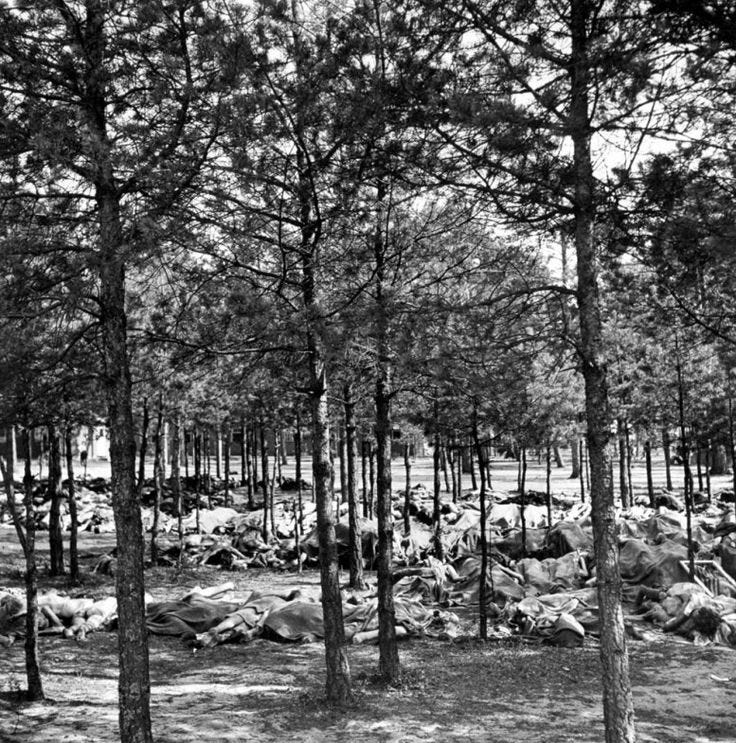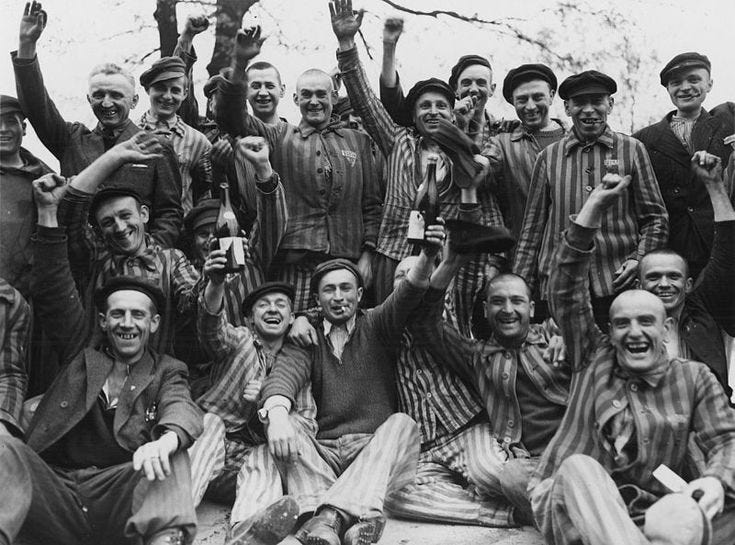Welcome to today’s edition of That's A Good Idea. If this is your first time reading, subscribe here.
One quick thing:
If there is a recent essay that has sparked your curiosity, given you a new idea, or in any way contributed positively to your daily life please consider supporting That’s A Good Idea with a $5 monthly subscription. I want, more than anything for TAGI to remain something you look forward to reading each week and your support helps me to gauge if I am on the right track. While I don’t write to make money, any small contribution is greatly appreciated. Additionally, if there is a specific topic, idea, or book you’ve read recently that you’d recommend me digging into, let me know in the comments below!
Now onto today’s edition…
Logotherapy: How Kindness Can Transform Hell
Viktor Frankl’s Father died of starvation at the Theresienstadt concentration camp. The year after, his Mother and Brother died in the gas chambers at Auschwitz. In the winter of 1945, After spending three years in three camps, Frankl and his wife Tilly packed into freezing cold train cars on the way to the Bergen-Belsen concentration camp deep in Northern Germany. The Third Reich was on the defensive on both the Eastern and Western Fronts, and Hitler’s Final Solution was reaching its murderous peak.
Viktor and Tilly were two of the 85,000 men, women, and children taken to Bergen-Belsen on over 100 transports and death marches starting in December 1944. At the macabre height of Hitler’s Final Solution, Bergen-Belsen had been transformed from a work camp to a death camp. Adequate food and clean water were nonexistent. Prisoners were forced to work in the freezing cold without warm clothes. The unburied bodies of 13,000 prisoners spread rampant disease in the crowded bunkhouses, where the starving and dying shared heat with those who clung faintly to life. Each day 500 died from starvation and disease. In March 1945, Tilly died of Typhus, one of over 18,000 deaths that month in the camp.
But Frankl, a practicing psychiatrist before the war, saw something in this daily hell that gave him optimism. He saw other human beings acting with empathy, kindness, and benevolence. He saw that true meaning revealed itself in the darkest and most horrific aspects of existence.
Frankl wrote:
We who lived in concentration camps can remember the men who walked through the huts comforting others, giving away their last piece of bread. They may have been few in number, but they offer sufficient proof that everything can be taken from a man but one thing: the last of the human freedoms -- to choose one's attitude in any given set of circumstances, to choose one's own way.
Frankl’s observations of human selflessness during his imprisonment led to the development of a philosophy and form of psychotherapy in the aftermath of war. He called it Logotherapy.
Derived from the Greek word "logos," which means "meaning," Logotherapy describes that meaning; how it is found, cultivated, and spread, is the foundation of our psychological and emotional needs.
Our dignity and strength to endure any "how" can only be found in our "why," and it’s up to us, as sovereign and responsible individuals to find it.
Denying Death
Anthropologist, Ernst Becker, in his 1974 Pulitzer Prize-winning book, “The Denial of Death”, describes the ways in which human beings, across cultures, interface with the inevitable reality of death.
Becker describes the strategies we use, on both a personal and global scale, to deny the physical reality of death. From his perspective, the Nazi project sought to create an aspirational and heroic infinite identity based on the racial and cultural characteristics it deemed desirable and clean. On an individual level, it was this same fear, of being forgotten by time, that motivated and ignited Hitler’s personal ambitions. A meaning fostered out of resentment and fear, instead of an altruistic responsibility to others.
In the diseased and crowded concentration camps, this same impulse to deny death was reflected in sharp juxtaposition to the Nazi project. The need to spite death, to fight back against uncontrollable suffering by acting with the same grace and compassion as one would when sharing a meal with dinner guests. To offer warmth and comfort when there is little to be shared; to acknowledge that life always persists in the depths of hell. This is the choice that was made.
Becker wrote:
Man cannot endure his own littleness unless he can translate it into meaningfulness on the largest possible level.
Frankl, like Becker, understood that small acts of good are collective outbursts to deny the face of suffering. To give and affirm the power of life as a part of collective immortality.
These acts of kindness aren’t small in any way, they are grand symbolic gestures and there is a network effect that occurs with human behavior. We see one pattern of behavior, and we mimic it. It spreads until the gesture becomes common and normal. Frankl saw these altruistic acts as a way to scrape meaning out of the depths of a nightmare, and to deny the soul-crushing reality that the camp was inflicting on their physical body.
The Responsibility of Meaning
Meaning is not only found in the void of suffering and pain. It must be cultivated every day of our lives. Material pursuits, external validation, and hedonistic binges give us the illusion of meaning but lead us to what Frankl called, “an existential vacuum”; a hollow and automated existence. An existence that leaves our minds open to the infliction of philosophies and ideals from demagogues and tyrants.
Logotherapy sought to armor our minds from the dark tendencies of our human nature, through cultivating meaning through an exploration of our thoughts toward others and the inevitability of suffering.
There are five component parts which Frankl outlined in his practice:
Freedom of Will: Frankl believed in the freedom of will, asserting that individuals have the power to choose their attitudes and responses to any given situation. Even in the most challenging circumstances, individuals retain the freedom to find meaning and purpose.
Search for Meaning: The core concept of Logotherapy revolves around the idea that life is inherently meaningful, and individuals should actively seek and create meaning in their experiences. This meaning could be derived from work, relationships, creative endeavors, or the attitude one takes toward unavoidable suffering.
Responsibility: Frankl emphasized the importance of taking responsibility for one's own life. This involves acknowledging the freedom to choose one's response to situations and recognizing the role of personal responsibility in shaping one's destiny.
Attitudinal Values: Logotherapy encourages individuals to adopt positive attitudes, even in the face of adversity. By focusing on values and attitudes, individuals can find purpose and meaning in their lives, regardless of external circumstances.
Existential Vacuum: Frankl identified an "existential vacuum" in individuals who experience a lack of meaning in their lives. This vacuum can lead to boredom, apathy, malevolence, and various forms of psychological distress.
Frankl emphasized, that the reality of suffering is not a matter of “if”, but “when”. Your loved ones will pass. You will be sick or inflicted with an incurable disease. Like Frankl, you and your family may be uprooted by conflict, war, or even genocide.
When we take the steps today to find what brings our lives meaning; to bring small acts of kindness out of the void and into the world, we contribute to the infinite good. We become a part of something that lives forever, that connects us to others.
We not only understand meaning, we create it.
As always, thanks for reading.
-Joe
“You have power over your mind - not outside events. Realize this, and you will find strength."
- Marcus Aurelius









I'm Akshay, write about self improvement--while surfing though substack i just stumbled up on this and im glad for it because I believe humans are built to exchange kindness, even if you doesn't receive it instantly, you'll get that from another person act or behaviours. Thats how this world works;)
"Between stimulus and response there is a space. In that space is our power to choose our response. In our response lies our growth and our freedom." One of my favorite Viktor Frankl quotes.